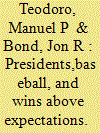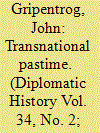|
|
|
Sort Order |
|
|
|
Items / Page
|
|
|
|
|
|
|
| Srl | Item |
| 1 |
ID:
160270


|
|
|
|
|
| Summary/Abstract |
Baseball occupies a privileged position as Japan’s most popular sport, commanding ample attention across numerous levels and contexts of play. Baseball’s popularity has also inspired value-laden and sometimes nationalistic language around its athletes and how the sport is played. These associations, linking baseball and its athletes to the Japanese nation today, arise in a diverse sporting landscape where transnational movement by athletically gifted individuals is possible. This article asks how the bodies of non-Japanese baseball players are remade or rejected as Japanese baseball bodies. Through a focus on interpretations of bodily capability and athletic potential, I map shifting views of transnational identity as they are tied to bodily interpretations. I argue that how athlete’s accomplishments and failures are viewed and interpreted insidiously serve to embed perceptions of racial and ethnic difference. These perceptions of difference divide Japanese from non-Japanese baseball players through a focus on height, strength, and speed as well as attitude, reverence, and commitment to the team and its hierarchies. Baseball thereby becomes a conduit that perpetuates and preserves categories of ethno-racial difference and superficial views of the other.
|
|
|
|
|
|
|
|
|
|
|
|
|
|
|
|
| 2 |
ID:
153790


|
|
|
|
|
| Summary/Abstract |
Presidential scholars and baseball writers debate who were the greatest. While baseball analysis evolved from qualitative impressions of “experts” to rigorous, data-driven “sabermetrics,” analysis of presidential greatness continues to rely on “old-school” reputational rankings based on surveys of scholars’ qualitative assessments. Presidential-congressional relations and baseball are all about winning, but what fans (of sports and politics) find most intriguing is Wins Above Expectations (WAE)—did the team do better or worse than expected? This paper adapts the Pythagorean Expectations (PE) formula developed to analyze baseball to assess legislative success of presidents from Eisenhower to Obama. A parsimonious regression model and the PE formula predict annual success rates with 90% accuracy. The estimates of WAE from the two approaches, however, are uncorrelated. Regression analysis does not identify any president who systematically exceeded expectations, but sabermetric analysis indicates that Republican presidents outperform Democrats. Neither approach correlates with recent presidential greatness rankings.
|
|
|
|
|
|
|
|
|
|
|
|
|
|
|
|
| 3 |
ID:
095525


|
|
|
|
|
| Publication |
2010.
|
| Summary/Abstract |
On September 18, 1931, Japanese troops bombed a section of the Japanese-operated South Manchurian Railway outside the city of Mukden, blamed it on Chinese troops, and then used the manufactured incident as a pretext to conquer all of Manchuria.1 Within a year Japan formalized its territorial aggrandizement by "recognizing" the puppet state of Manchukuo. The Japanese advance in Manchuria was an epochal moment in world history, widely regarded as the first salvo of World War II. Historian David Kennedy asserts, for example, "On the wind-scoured plains of Manchuria, Japan . . . set the match . . . to the long fuse that would detonate the attack on Pearl Harbor just ten years later." Japanese scholar Saburo Ienaga similarly states, "The Pacific War began with the invasion of China in 1931," adding that events at the time "are inseparable, all part of the same war." Walter LaFeber meanwhile writes in his survey of U.S.-Japan relations that "World War II's roots ran back to September 1931, when the Kwantung Army struck to place all Manchuria under Japanese control."2 In logical accordance with this interpretation, some historians claim U.S.-Japan relations soured irreconcilably in the aftermath of Japanese aggression. "From this time on," writes Paul Schroeder, "the United States was to grow steadily more suspicious and hostile, until she finally stood militantly opposed to Japan's aggressive expansion." Another scholar adds that Japan's popularity among the American public "declined rapidly" following events in Manchuria.
|
|
|
|
|
|
|
|
|
|
|
|
|
|
|
|
|
|
|
|
|